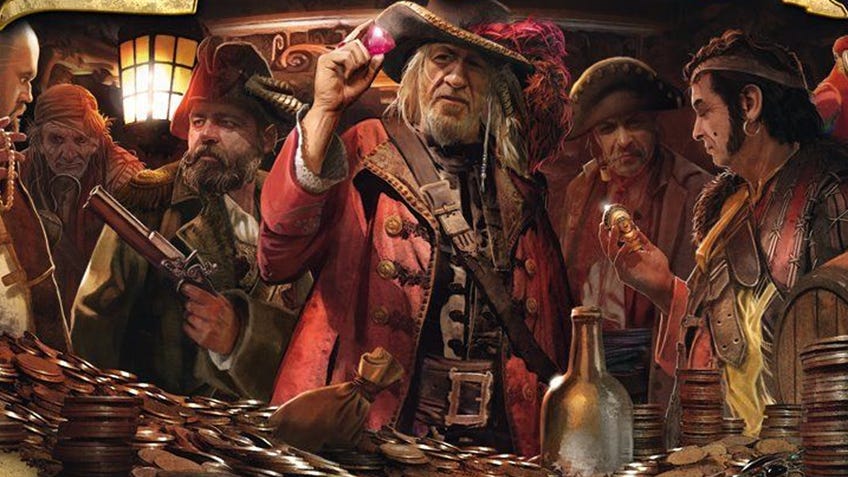4 best out-of-print board games that deserve to come back
Live, Die, Reprint.
Preservation is an important thing across all mediums, whether it’s films, books or games. Your favourite MMO might lose its servers and you may never play it again. Your Game Boy cartridge’s battery dies, and suddenly all of your Pokemon are dead. If it's a board game, it could be even worse. Maybe the company who prints your favourite game stops printing it altogether. Your beloved game’s continued existence then relies on some flimsy box of cardboard and plastic being kept safe somewhere that you might not even be able to visit.
Best out-of-print board games
- Libertalia: Scheme on the Seven Seas in the pirate card game.
- Android: Netrunner: The exceptional cyberpunk card game that only lived twice.
- Shadows Over Camelot: Find the traitor among the Kings of the Round Table before the kingdom falls.
- The Republic of Rome: Live out your own "Eu tu, Brute?" moments of betrayal in a treacherous senate.
That's why it's really, really sad to look at some of the best out-of-print board games that we wish we could still play. And we hope that we'll see again that one day. With that in mind, to honour some of our fallen comrades, here's some out-of-print games that we wish were still around today, and weren't so impossible to get hold of.
1. Libertalia
A cut-throat card game of bluffing and booty
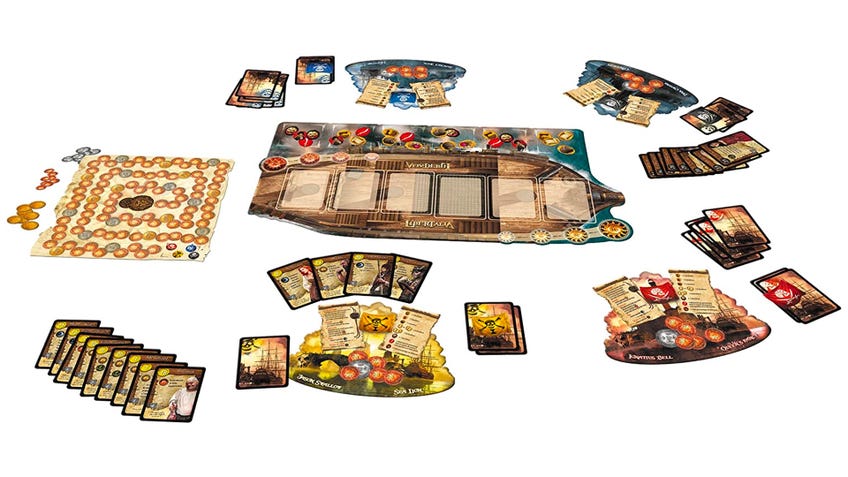
Do you love booty? Do you love sailing the Seven Seas? Do you love reading your friends’ minds? Well then, Libertalia might just be the game for you.
Libertalia is a role-selection game for two to six players. It's a game in which you play as pirate captains with an identical deck of 30 cards. Each round, one player will at random shuffle their deck and choose nine cards out of that deck. The other players have to then go through their deck and make sure they pick out the same cards, so you all have exactly the same cards to hand.
You play over six turns, three rounds. There are several different day phases - day, dusk, night - and then something that happens at the end of the week. Each turn, there's a possibility to get some booty at the end of the day. The booty that is divvied out at the end of each day is drawn at random from a bag and it will include anything from a gold chest, jewels, a cask, maps - which earn you points by collecting sets - as well as things like the Spanish officer, which will kill the character that you played that turn. There’s also the sword, which lets you kill somebody else's player character from their den - which can be great if they have something really good that will only set off at the end of the week. And cursed relics, which are minus three points for each cursed relic that you have at the end of the week.
Figuring out which card to play on any given turn is all about looking at the booty that's to hand, trying to work out what you want and then also trying to work out what the other players are probably going to play because you know what cards they have. Cards are numbered from one to 30, which represent the rank of that character. They all have special abilities that are written on the cards. If you play the same ranked card as somebody else there is another number on each card, which is the influence that character has, so there's a tiebreaker.
You play your cards facedown, they all get revealed at the same time and then you put them in ascending order from left to right. Any day powers they have get triggered from left to right, as well. So you start with the lowest-ranked character, do their ability and move up along the ranks like that. But when it comes to divvying up the booty, which happens in the dusk phase, you start with the highest rank and work from right to left. Libertalia is quite interesting in the way that the lower-ranked characters, even though they are last, choose the booty. They can quite often mess with the higher-ranked characters depending on what their day ability is. There's the bird, for example, who can knock out the highest-value card, or the beggar, who steals from the player with the highest-value cards. It's all about working out what's best for you, but also trying to second-guess what your opponents are going to do and using that to your advantage.
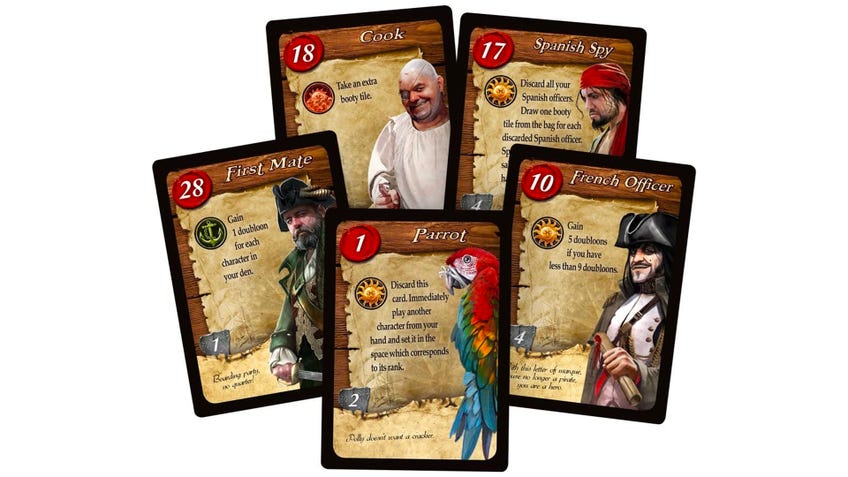
You're also kind of trying to plan the whole week based on the cards that you have, because a lot of cards will work really well in certain combinations and based on the booty that is there. There are a lot of different factors to take into account. Having said that, Libertalia is a really simple game that’s easy for beginners to pick up straight away.
Because it’s out-of-print, Libertalia is either ridiculously expensive to pick up or just not really around, aside from board game websites such as Board Game Arena. If you can get a copy, grab it with both hands.
Alex Lolies
2. Android: Netrunner
A legendary cyberpunk card game from the creator of MTG
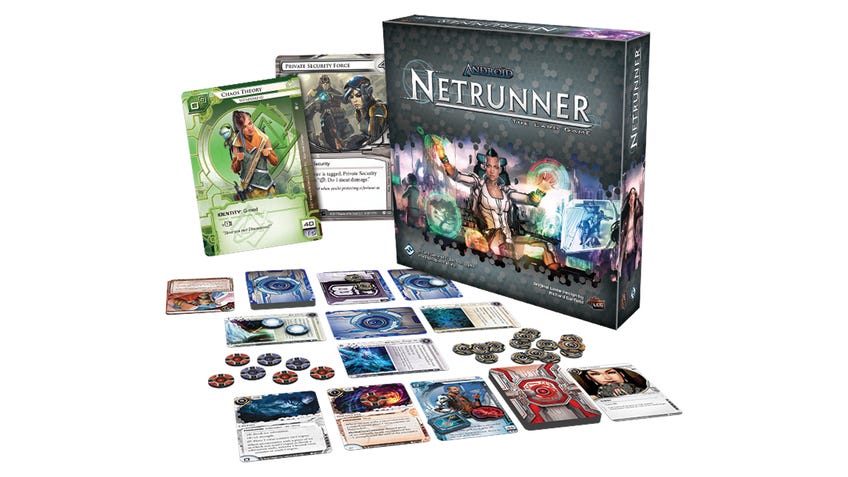
Netrunner is the card game so good it lived - and died - twice. But if any game deserves another shot at life, it’s this one.
Richard Garfield might best be known as the creator of Magic: The Gathering, but Netrunner - originally released only a few years after Magic - is arguably his true masterpiece. Like Magic, Netrunner is a head-to-head card game, but here the players’ spells are software and their creatures lines of code.
One player is a rogue hacker known as a runner, trying to infiltrate the systems of their opponent’s corporation in order to steal valuable data and make it out. The megacorp player has the power of firewalls and security on their side, known in-game as ICE.
While the basics of the game are the same - players spend clicks and credits to play cards, hoping to score seven agenda points before their rival - Netrunner is two very different games depending on which side of the table you’re sat.
The corp player must set up and protect remote servers containing agenda points with layers of ICE, represented by lines of cards on the table. The runner, meanwhile, prepares for their digital heist by installing programmes, before making runs in an effort to pass the corp’s ice and hack into a remote server - hoping that it contains precious data, and the points they need to win.
But the runner won’t know exactly what they’re up against until they make a run, with the corp playing cards facedown and paying credits to ‘rez’ and reveal traps and obstacles as the hacker encounters them - hoping to force the runner to suffer damage and even jack out before they reach the server.
Netrunner’s exceptional combination of asymmetrical gameplay, bluffing, strategy and tension as the two players throwdown in the virtual arena made it unlike any game before or since. It’s rightly held up as one of - if not the - greatest card games ever made, helped by its engrossing futuristic world of dystopian corporations and underground hackers.
Maybe it was too good to last.
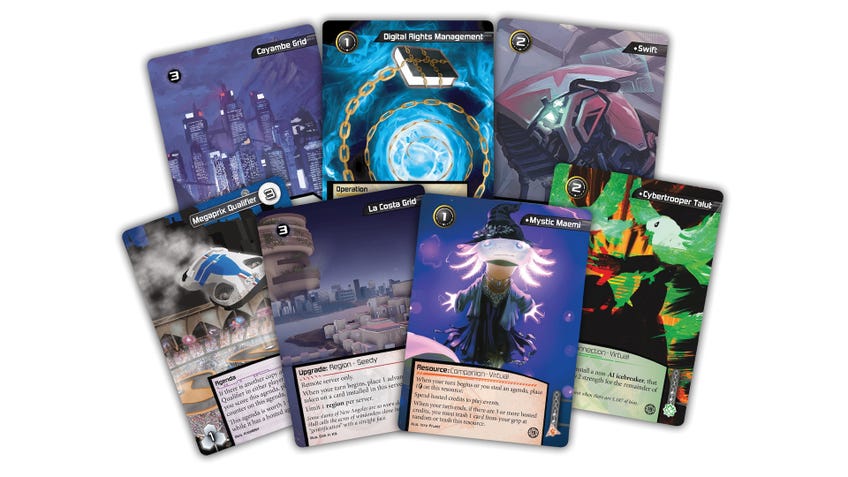
The original Netrunner only lasted for a less than a handful of years before being dropped by Magic: The Gathering maker Wizards of the Coast around the turn of the millennium. For over a decade the game sat as a lost masterpiece, before hope came in the form of Fantasy Flight Games, which relaunched the collectible card game as one of its living card games.
Fixed expansion boxes replaced randomised booster packs, and the game was moved from its original shared setting with tabletop RPG Cyberpunk 2020 to the world of Android. Android: Netrunner arguably pulled off the impossible by improving on near-perfection, and for six years it soared with a number of expansion cycles, new releases, tournaments and the release of a brand new core set.
Then, it died. Only a matter of months after its revised core set marked a fresh way for new players to jump into the game, Android: Netrunner was cancelled in late 2018 as the result of a licensing split between Wizards of the Coast and FFG. It was the second untimely demise for Netrunner - and, for now at least, a permanent one.
Luckily, the game going out of print officially hasn’t made it completely impossible to experience. A group of fans have taken it upon themselves to keep the card game going with Project NISEI, an organisation that releases unofficial new cards, expansions and rotations for Android: Netrunner. You can pick up the fan-made game online and get a taste of Netrunner’s brilliance for yourself without having to track down a rare - and potentially pricey - copy of the original.
Will we ever see Android: Netrunner return in full? No-one knows. With the success of its distant relative Cyberpunk Red and the renewed interest in sci-fi worlds on the tabletop, hopefully Netrunner will have another chance to capture the hearts and minds of another generation of players. Until then, the twists and turns of its story only add to the legend of a legendary game.
Matt Jarvis
3. Shadows Over Camelot
Protect the realm or work to destroy it in this fantasy social deduction gem
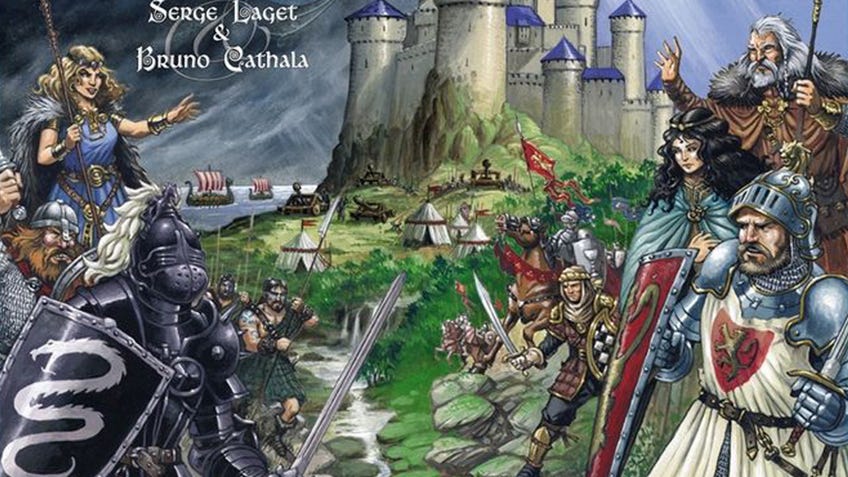
Behold! Camelot! The land of chivalrous knights, magical relics and great deeds. Will you come to its rescue in the kingdom’s hour of need? Or will you bring about its downfall? Take the ultimate test of faith and… blah, blah, blah.
That was a bit about Shadows Over Camelot, a co-op game that’s been out of print for a good few years, and one that hasn’t got the most original of themes. In Shadows Over Camelot, you play as the Knights of the Round Table aiding the king - that’s Arthur - in his attempts to protect Camelot from an invading army of Saxons and Picts. However, what the game lacks in thematic originality, it more than makes up for in gameplay.
The Knights of the Round Table are an ancient medieval order that’s represented in this board game by, of course, King Arthur, Sir Galahad, Sir Bedivere, Sir Gawain, Sir Kay, Sir Tristen, Sir Palamedes and, the best of the bunch in may opinion, Sir Percival. (Don’t you just adore his flowing locks and shining armour that’s decorated with beating hearts?)
Though they are all equally noble, each knight has their own special power they can use to aid the group throughout the game. For example, King Arthur can exchange cards with another knight at any point on their turn. Whereas, whenever they use the ‘draw cards’ action on their turn, Sir Gawain can draw additional cards. Very handy.
Do allow yourself to be blinded by their outrageous chivalry and beautiful hair, because one of these knights is not who they seem. You see, someone has defected to the side of evil and will use their position in court to subtly influence decisions for the worse.
Remember that army of Saxon and Picts? Well, if they overwhelm Camelot with their siege engines, then the kingdom falls and the heroes lose. Well, turns out that this traitorous knight is working with that particular invading army right under the players’ noses. And it could be any one of you! The audacity!
Players can actually decide whether they want to experience Shadows Over Camelot with the traitor mechanic, as it’s recommended that first-time players try the game without it, but where’s the fun in that? If they do want to take the traitor challenge, they secretly draw cards at the beginning of the game to see where their loyalties lie. It’s the traitor’s job to subtly make it more difficult for the other players to achieve their win condition. Which, frankly, won’t be too tough if the heroes don’t have their eye on the ball because this game is hard.
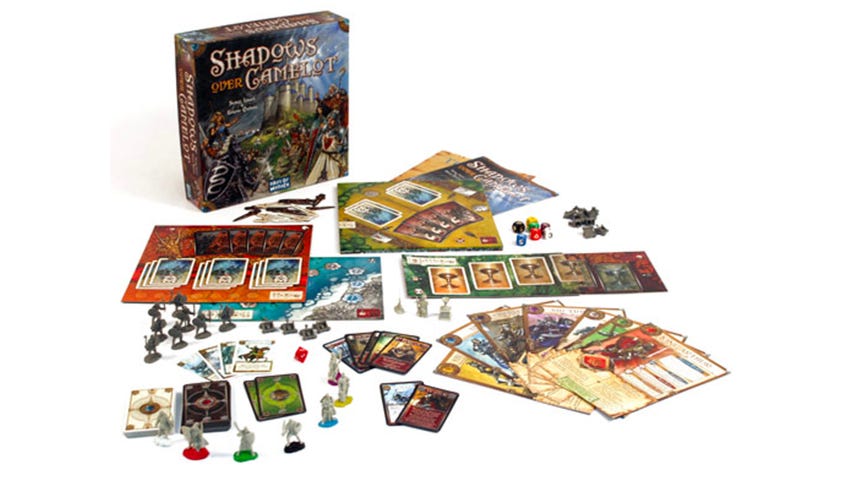
So, what exactly do the heroes have to do to win? There are a number of quests players can choose to pursue - from classic feats of Arthurian valour like obtaining Excalibur from the lake or finding the Holy Grail - to more standard fare such as fighting back the incoming hordes of Saxons and Picts. Either way, quests can be completed by playing certain white cards that can be obtained back at the home base in Camelot.
The heroes must work together to gather enough of the right cards in order to finish each quest, which will place white swords on the Round Table - enough of those and the knights win the game. However, quests can also be failed, causing the dreaded black swords to ring around the table instead. Too many of those means that the heroes can kiss their knightly behinds goodbye.
If that wasn’t bad enough, at the beginning of every player’s turn the active knight must perform one of three possible “evil actions”. This delightful selection includes adding a siege engine to the army outside Camelot, drawing a black card that can either push a quest closer towards failure or do even nastier stuff, or have the current player take damage. Any failed quests are locked for the remainder of the game and characters can die, meaning that these evil actions have dire consequences for the heroes. Choosing which one to enact at which time is essential to the fate of the game, requiring intense discussion between the players. If a certain traitorous player happens to convince the others to choose a particular evil action then things could go really badly, really quickly.
Alternatively the traitor can just reveal their true nature at any time, flipping their character sheet over to unleash their final form. The traitor’s actions will now consist of just doing outright bad stuff to mess up the heroic player’s plans. What a jerk. But if the heroic players can get their hands on some powerful relics and put their heads together, they can survive to make some clever sacrifices and ensure the future of Camelot.
Shadows Over Camelot is one of those masochistic experiences that players can share together. Every turn makes things appear grimmer and grimmer, with knights falling left and right whilst a sea of towering siege engines knock on the castle doors. But it’s not impossible to win. If the players can sniff out the traitor and use each turn efficiently, then they’ll have a chance at success. Or it could be a complete mess that descends into failure quicker than you can say “Where’s Lancelot?”
Either way, Shadows Over Camelot is an entertaining tabletop experience that I want to see make a glorious return soon.
Alex Meehan
4. The Republic of Rome
Manage the Empire while also plotting your own rise to power
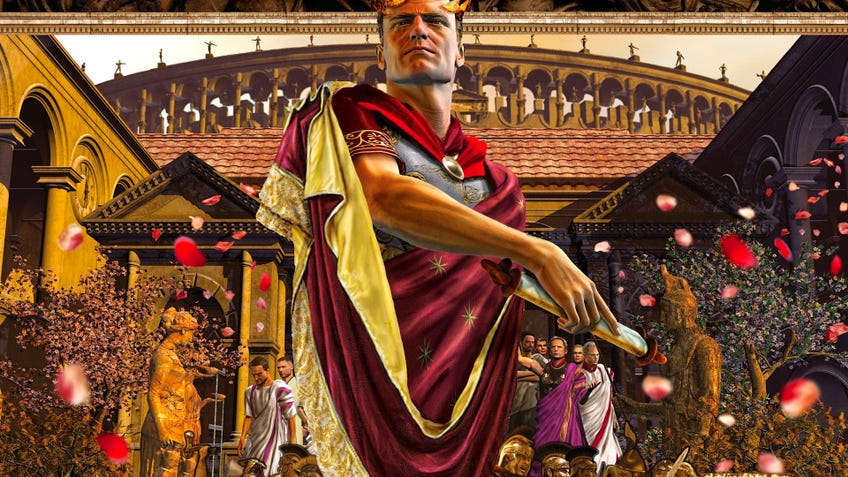
The Republic of Rome is an absolutely massive semi-cooperative game that puts players in charge of a faction of senators, all of them working together - sort of - to make sure that Rome doesn't fall due to wars on the edges of the Empire or famine or revolt from the people. But also making sure that, by the end of the game, they are powerful enough to elect one of their own as consul for life and effectively end the Republic and make it into an autocracy.
The reason I love this game so much is that it should be really quite dry. It's this enormous board with all of these different metrics talking about this is how happy the people are, here are some upcoming wars, here are the current wars we need to prosecute, here's the table you roll at the very start of the senate phase when the current console makes a speech to open the Senate and the people will react accordingly, and so on. You could interact with all of these things solely on a mechanical basis. But that would be dull. Preferably everyone should be wearing a bedsheet toga. By roleplaying, The Republic of Rome becomes one of the most chaotic and wonderful board game experiences I've ever had.
It isn't necessarily a perfect game. There are certain bits that are definitely not well-rounded. The rulebook is a nightmare. It will ask you to look up other bullet points - literally, "look up bullet point 24 B (II)" - but 24 B (II) doesn't exist, there are some bits of the rulebook that just aren't there. So there's a healthy amount of fudging that needs to happen.
But this is also a game that mandates that somebody makes a speech at the top of every round. And, oh yeah, you can try and assassinate people - and if that doesn't go well, you can be put on trial. In the past, we've created a dock out of a clothes horse. The Republic of Rome is one of those games that is very, very earnest and is perfectly enjoyable in that way. I've played this game in fairly low-key drama stakes, and we've had a perfectly serviceable time. It's pretty good. But it's when everybody leans into the fact that they have a cast of characters, and a faction of senators with its own sort of logo and its own personality, that it becomes something screamingly hilarious.
That's why The Republic of Rome should come back come back into print: so that I can try and influence more people to strip their beds, stick on a toga and spend an entire day roaring at one another.
Johnny Chiodini
